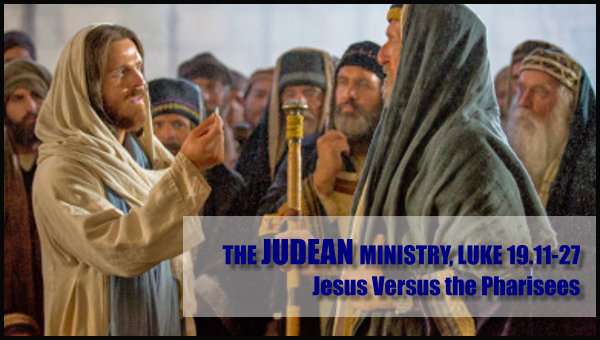By Tyson Thorne

The Judean Ministry at Various Cities (18.1-24.53), 20.1-
Sometime after clearing the temple we find Jesus teaching in its courts and proclaiming the gospel. From this point forward events are going to happen quickly leading up to the climax. This encounter with the Pharisees of the temple is the first event that leads them down the path to a place where plotting Jesus’ demise is the only end. The religious authorities appear before Jesus to challenge him. They have not given their blessing to his teachings so they want to know, “By what authority are you doing these things?” Thinking they could trap him, Jesus proves more shrewd than they.
Jesus’ response reminds me a bit of God speaking to Job through a whirlwind saying, “Brace yourself like a man! I will question you and you shall answer me.” What Jesus actually said was, “I will ask you a question, and you tell me…” He goes on to issue them a challenge, which is a trap just like their question. Recognizing this, the Pharisees not so cleverly answered that they didn’t know. They did know, however, and Jesus knew it. “Then neither will I tell you by whose authority I do these things,” Jesus said.
The Messiah wasn’t about to let it end there, however. Turning to the crowd he told a parable with the villains being not-so-cleverly-disguised Pharisees and religious leaders. In the story a wealthy land owner leases his property to others to go on a trip. He sends around several men, one at a time, to collect the rent but each is met with resistance. Events escalate and become violent. Finally, the land owner sends his only son who is murdered. The land owner then goes to them himself with armed men and utterly destroys the lot of them.
The parable, of course, parallels God having sent prophets to the nation of Israel to get them to turn from wickedness and toward righteousness. Eventually God sent his only Son, whom they will murder very shortly. Jesus makes the religious authorities responsible for the deaths of the prophets, enraging the Pharisees and setting them to plot against the Messiah. To that end they conspired with others in an attempt to trap Jesus into promoting criminal actions against Rome.
The Pharisees planted members in the crowd to ask Jesus about the issue of paying taxes. In this well-known account Jesus astounds the crowd by asking for a coin. After getting them to rightly state that Caesar’s portrait is engraved on the coin, he famously stated, “Give to Caesar the things that are Caesar’s and to God the things that are God’s.” This rightly silenced the Pharisees spies.
We see in verse 27 that the conspiracy extended beyond the Pharisees themselves and into all the religious authorities. Here we see the opposition party, the Sadducees, are also intent on bringing Jesus down. Why would they ally themselves with their religious opponents? Because Jesus threatened them all. Jesus’ popularity among the people could elevate him to power and overthrow the religious leadership. It never occurred to them that they could have simply repented of their lust for power and begin serving God and the people as they were supposed to do.
So the Sadducees also tried to entrap Jesus. Their question is strange, considering the source. The Sadducees did not believe in a bodily resurrection, and yet their question is about just such an event. A woman who married into a family but never bore children was entitled to become the wife of the next closest family member upon the death of her husband. (This tradition is explained and a large part of the plot in the book of Ruth.) The woman became the wife of each brother in turn, until all of them had died. The question was simply, whose wife would she be at the resurrection? Again, Jesus skillfully avoids the trap by revealing information about Heaven we did not have before, that at death marriage is dissolved. The reason for this is simple, since everyone is immortal (like the angels) there is no need for procreation.
Jesus took one more step across the line in the sand drawn by the Sadducees and proved them wrong in their belief that there was no resurrection. Jesus points to Elohim’s title, the God of Abraham, Isaac and Jacob. Since God id the Lord of the living, the patriarchs must be preserved alive for the resurrection. This is a truth that should be both comforting and exciting to every believer.
|
|
